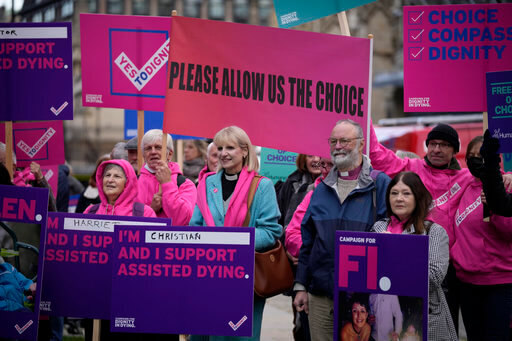Today the Assisted Dying Bill comes before the House of Lords for its Second Reading. It seeks to repeal the long-established crime of assisted suicide in certain medical and personal circumstances where the patient requests this, there is agreement of two doctors, and confirmation by the High Court through its Family Division. This is a grave and profound step for any legislature to determine. It merits rigorous examination.
The good will and well-intentioned approach of those involved in favouring assisted suicide is not determinative in such a process. The dangers of such a new law are several and very serious. The Bill favours the minority of the invulnerable against the majority of the vulnerable.
At the centre of the Bill is the clear and sure decision of the afflicted person to have an assisted suicide. However, many messages have been sent to parliamentarians especially emphasising the role of families in decisions not to pursue assisted suicide, despite the suffering for all involved, so it is not simply an issue of raw autonomy.
With what weight of studies and of different conditions can it be reliably, medically concluded that the primary requirement of the Bill for a terminal illness with no more than a reasonable six months’ prognosis is satisfied?


What of the effect on existing palliative care units where assisted dying already takes place with the provision of treatment, care, and understanding? One foreign jurisdiction has already introduced a requirement to facilitate assisted suicide in such units on economic grounds. How are the two doctors to investigate and exclude coercion and undue pressure by family members, as the Bill requires? Are they to investigate the views in each case of those relatives against assisted dying as well as those relatives for?
The final decision by the Family Division judges is clearly not going to be a simple rubber-stamp exercise.
In the Supreme Court decision on Nicklinson in 2014, Lord Wilson, a lifelong expert in family law, specifically dealt with assisted dying and set out no less than 18 potential factors a judge might wish to investigate before deciding on whether to consent. He described the “scrupulous nature” of any such inquiry.
And what of oversight of the medical responsibilities for providing assisted suicide? The Bill would introduce a system of Codes of Conduct for assisted suicide procedures. They would come from the Government, presumably after consultation with the medical Colleges. The Codes would then go to Parliament for consideration by the statutory instrument route rather than legislation. So they could not be amended, and yet the Government, at the time of the last such bill in 2014, said this issue of assisted suicide was for Parliament not for Government policy. How is the voice of Parliament to be heard effectively in this scenario?
The Bill would enact that the fatal medicines be given by the attending doctor or another doctor or nurse authorised by him. What if they have a conscientious objection, said to be protected in the Bill? Could they refuse or would they be obliged to refer on to other staff who will do it? Will the Hippocratic oath of doctors not to intentionally harm patients now be dismembered? Will there be doctors who will not provide assisted suicide and others who will – applying the same oath but with drastic difference.!
And finally what happens to our health system? The Bill appears to apply to both private and public health. So public wards will have assisted suicide units? Will private health companies launch death clinics like Dignitas? And the Bill only applies to England and Wales. In Scotland and Northern Ireland, assisted suicide is not the law. Would this lead to cross-border searches within the Union for assisted suicide?
This is the third such type of bill to come before the Lords in recent times – 2005, 2014, and now 2021 – the earlier attempts did not succeed and nor should this Bill. There are, as there should be, some community-based limits on personal autonomy, especially as to living or dying.
As Lord Sumption notably said in his judgement in the Nicklinson case, a critical issue remains “how much risk to the vulnerable we are prepared to accept in this area in order to facilitate suicide by the invulnerable.”












